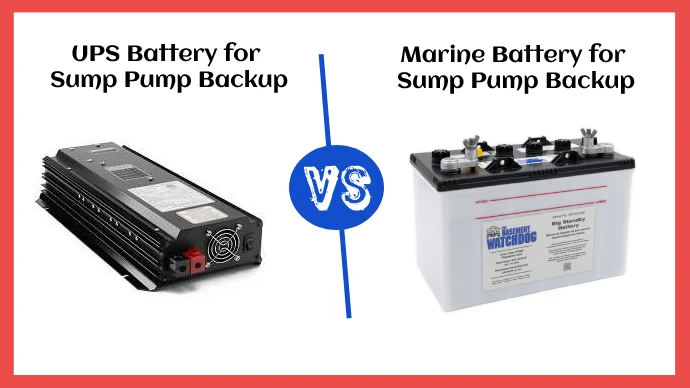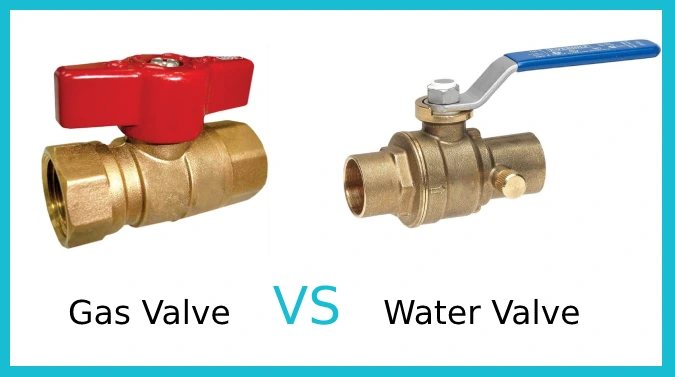Last Updated on April 15, 2023
When protecting your home from water damage, a reliable sump pump battery backup system is vital in case of power outages. While several types of batteries are available, two of the most common choices are UPS and marine batteries.
Although they serve the same purpose of providing backup power, significant differences lie in battery type and power output. UPS batteries are typically valve-regulated lead-acid or sealed lead-acid batteries. Meanwhile, marine batteries use deep-cycle lead-acid batteries.
Furthermore, UPS battery backups provide power for a minimal time, usually a few minutes or hours. Comparatively, marine batteries last several hours and are designed to provide sustained power.
So understanding the differences between these battery types is essential whether you are looking for a short-term backup or long-term power solutions. Continue reading to learn more about UPS and marine battery differences.
UPS VS Marine Battery for Sump Pump Backup System: Differences

While UPS and marine batteries have unique features, understanding the differences is essential in making an informed decision for your specific needs. Here are some critical distinctions between the two types of batteries for your battery backup sump pumps:
Battery Type
UPS batteries are generally valve-regulated lead-acid (VRLA) batteries or sealed lead-acid batteries. This type of battery is often used in data centers and other critical applications where even a short loss of power can cause significant damage or data loss.
On the other hand, marine batteries use deep-cycle batteries that are specifically designed to provide power for extended periods. These batteries have thicker plates and can withstand constant discharge and recharge cycles, making them ideal for battery backup sump pump systems.
Battery Size & Weight
UPS batteries are generally smaller and lighter than marine batteries. This makes them more portable and easier to handle, especially if you need to move them to different locations. The smaller size makes them a good choice for those with limited space.
Meanwhile, marine batteries are larger and heavier due to their higher capacity and durability. They are designed to withstand harsh environments and constant vibrations, making them an ideal choice for boats and other marine applications.
Power Capacity
The power capacity of a battery is one of the most important factors to consider when choosing a backup power system for your sump pump. UPS batteries provide short-term backup power. They are not designed to provide continuous power for extended periods.
In contrast, marine batteries have a much higher capacity and can last much longer. They are ideal for sump pump backup systems that may need to run for several hours or even days without interruption.
Backup Time
UPS batteries are designed to provide backup power for a limited time, usually from a few minutes to a few hours. The duration of backup time depends on the battery’s capacity and the power consumption of the sump pump.
Conversely, marine batteries are designed to deliver sustained power for extended periods, typically from 5-7 hours to a few days. This capability makes marine batteries ideal for prolonged pump backup power outages.
Charging Time
The charging time for UPS batteries is relatively short compared to marine batteries. UPS batteries take only a few hours to charge fully, which makes them ideal for instant use.
As a counterpoint, marine batteries can take up to 24 hours or more to charge fully, making them unsuitable for situations that require instant power.
Marine batteries have an extended charging time due to their larger capacity. The charging time can vary depending on the charging rate and the battery’s condition. The charging time for marine batteries can be reduced by using a higher charging rate or by ensuring that the battery is not completely discharged.
Recharge Cycles
One of the most significant differences between UPS and marine batteries is the number of recharge cycles they can handle. Typically, UPS batteries can handle around 1200 charging cycles and discharge around 70% of their total charge capacity.
In contrast, marine batteries can handle more charging cycles, and more than 3000 charging cycles and can discharge to as low as 80% to 100% of their full capacity. This means marine batteries can hold up more reliably over time and provide more extended periods of backup power.
Battery Durability
When it comes to durability, marine batteries are the hands-down champions. They are designed to withstand the harsh marine environment with rugged exteriors, so they’re perfect for sump pump backup systems.
Alternatively, UPS batteries are less rugged and require special care when handling them. The marine batteries are designed to resist shock and vibration, making them suitable for use in boats and ships, and they can last up to ten years with proper maintenance.
Battery Maintenance
UPS batteries are relatively low maintenance and require minimal checks to ensure they function correctly. But marine batteries require more maintenance, such as regular cleaning and charging, to ensure they function at peak performance.
It’s crucial to do regular testing with marine batteries using a voltmeter to determine their state of charge. Failure to maintain marine batteries can shorten their lifespan and make them unsuitable for emergency backup situations.
Can I Use a UPS as a Battery Backup for the Sump Pump?

Using a UPS as a backup for a sump pump is not recommended because the battery in a typical UPS is not large enough to run a sump pump continuously for an extended period. A UPS, or uninterruptible power supply, is commonly used to provide short-term backup power for electronic devices.
The battery has limited capacity, and if a sump pump drains it, it may only be able to power the sump pump for a short time. It’s essential to use a battery backup system designed explicitly for sump pumps to ensure reliable operation and protection against flooding.
Is a Marine Battery Good for a Sump Pump Backup System?
A marine battery (AKA deep-cycle lead-acid battery) is an excellent choice for a sump pump emergency power supply system. This type of battery is specifically designed for deep-cycle use, which means it can be discharged and recharged numerous times without damage to the battery.
Unlike other batteries, designed for short bursts of high-energy output, a marine battery provides steady power over an extended period. The ampere-hours (AH) rating of a marine battery is an important consideration when choosing a sump pump backup system.
The higher the AH rating, the longer the battery can supply power to the sump pump. A marine battery backup system can protect against power outages and keep your sump pump running even during severe storms or flooding.
How Do You Choose a Good Marine Battery for Backup Sump Pump?

When selecting a marine battery for a sump pump battery backup system, there are a few key factors to consider:
Power Capacity: The battery’s power capacity should be well-suited for your specific sump pump. It is essential to choose a battery with a high enough power output to handle the demands of your pump while also providing extended use in the event of a power outage.
Backup Time: Also, backup time is crucial when choosing a marine battery for a battery backup sump pump. A battery should provide power for sufficient time to allow the sump pump to operate until power is restored.
Battery Durability: Finally, battery durability is an essential factor to consider. Marine batteries can handle harsh marine environments, which makes them an ideal choice for sump pump backup applications.
If you are looking for a reliable and durable marine deep cycle battery for the sump pump, visit this post to find an appropriate one. We have carefully reviewed some of the best deep-cycle batteries and compiled a list to help you decide which is best for your needs.
How Long Will a Marine Battery Power a Sump Pump?
Generally, a new fully-charged marine battery will last 5 to 7 hours of continuous pumping during a power outage. But, if the pumping is intermittent and infrequent, the battery can last up to 1 to 3 days. It is important to note that this is just an estimate, and actual results may vary.
The age and condition of the marine battery is also an essential factor to consider when it comes to longevity. If the battery is older or in poor condition, it may not last less time than a brand-new battery. Aside from that, if the battery has not been adequately maintained or charged, it may not hold a charge for as long as it should.
The size of the battery is also crucial to consider. A larger battery will have a longer lifespan than a smaller battery. Similarly, a battery with a higher rating will be able to power a larger sump pump for a more extended period.
Power Up Your Sump Pump: Wisely Choose the Right Battery for a Secure Backup
Choosing the correct battery is crucial when backing up your sump pump. While UPS and marine batteries provide backup power, there are significant differences in the type and performance of the batteries.
UPS batteries offer a quick energy boost, ready to kick in during unexpected power outages. But when you need serious staying power over the long haul, marine batteries are your preferred option, and they provide sustainable and reliable juice for days.
Consider your specific needs when deciding which battery type to choose for your sump pump backup. Prioritize the factors that matter most to you, such as run time or battery life. Doing so lets you make an informed decision and ensure you have the right backup power solution in case of a power outage.



